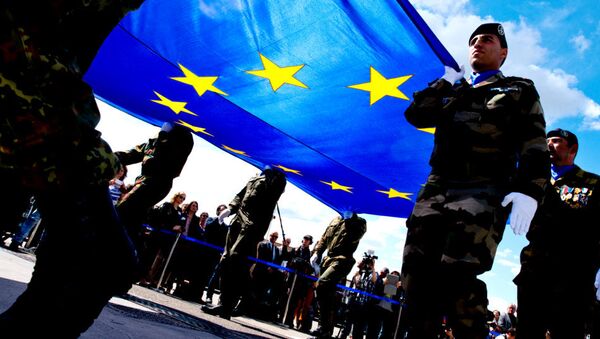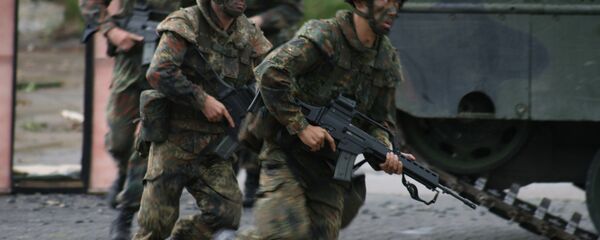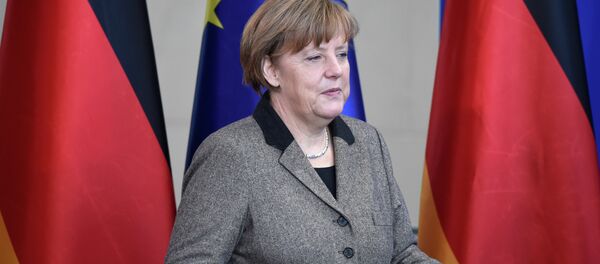Mateusz Piskorski, head of the European Center for Geopolitical Analysis, told Sputnik that the creation of a European army would aim to make Europe more independent and lessen the influence of the US on the European Union.
Mr Piskorski says this is isn't the first time the idea has been floated, and says it reflects a lack of understanding between Washington and Brussels.
"I think when it comes to the idea of common European defence policies, it's an old idea, and it comes out every time there is any disagreements between the United States and the European Union. Last time we heard about this idea was in 2003-2004 during the war in Iraq and the US aggression in Iraq."
The fresh call to create a joint European army was proposed by European Commission president Jean-Claude Juncker earlier this week, who said the EU needed to combat the perceived Russian threat and "convey to Russia that we are serious about defending the values of the European Union."
The EC chief argued that NATO wasn't a satisfactory military defence for the European Union, considering that not all EU members were members of NATO.
US, Not Russia the Target of EU Army
While Mr Juncker clearly stated that the creation of such an army would be to counter the tension between Brussels and Moscow, Mateusz Piskorski told Sputnik that he believes it would work towards establishing greater European independence from the US.
"So it's a kind of paradox because on the one hand, Juncker tries to be politically correct and is convincing everyone that we need protection from Russia, while on the other hand, the very essence and idea of this project would be quite anti-American, or would also be directed against the American military presence in Europe."
Dr. Alexander Neu, Bundestag MP from Germany's Left Party, agrees with Mr Piskorski in that the creation of a European army would limit Washington's influence in Europe.
"NATO is an instrument of American influence in Germany and the EU. It's the instrument that allows the US to fulfil its agenda in Europe. A united EU army would question the dominant positions of the US within NATO."
Dr Neu's Left Party are among a number of significant military and political figures in Germany who have expressed support for such an idea to create a European army.
The German MP told Sputnik that the idea of a pan-European military force lost traction in recent decades due to the actions of the US and NATO following the break-up of the Soviet Union, and says that Russia needs to be consulted on such issues to ensure the best chance of peace in Europe.
"The Left Party wants a new security architecture in Europe, a new system of mutual security. This is in line with the idea that Mikhail Gorbachev proposed in the 80s, where European security is like an apartment building, covering everything from Lisbon to Vladivostok. This system would effectively minimise all games and scuffles, because it would be focused on creating trust and mutually controlled disarmament, not on creating an arms race. This concept was lost over the last 20 years, because NATO and the US deemed themselves winners and saw no reason to meet Russia halfway.
"But it's impossible to imagine peace in Europe without Russia. Which is why I say: either the US supports peaceful policies in Europe, or Europe has to create its own peaceful policy, without the US, and create a new joint security system with Russia."
#WarIsComing Prez of European Union calls for creation of EU army to defend against Russia http://t.co/K6KWR1HZpl pic.twitter.com/BCSVugo202
— NoVicticratHere (@CalFreedomMom) March 9, 2015
It seems that it's not just Germany that supports the idea of a European army, with Turkish Minister for EU Affairs Volkan Bozkur last year saying that Turkey would contribute 60,000 troops towards the EU if the country was granted EU membership.
Despite the support from outside the EU of a joint European military force, Mateusz Piskorski from the European Centre for Geopolitical Analysis believes there would be significant interest for such a project within Europe as well.
"I think the main country which would be ready to support such an idea of a European army would be Germany, which is the most powerful country in the European Union from an economic and financial point of view. It could be the initiator for the creation of such an army. Then we have countries such as The Netherlands, Belgium, Luxembourg and France which would also probably be eager to join such a project due to its tradition of distancing itself from NATO concerning its rhetoric of European sovereignty," he said.
An #EU Army: A Tragedy for our Armed Forces — Get Britain Out — http://t.co/sgGgQVwCvo
— GetBritainOut (@GetBritainOut) March 11, 2015
However, not all have embraced the idea, with the UK — often seen as America's closest ally in Europe — vehemently opposing any proposals to create an EU-wide joint army, with the British government saying there was "no prospect" of them supporting such a plan.
"Our position is crystal clear that defence is a national — not an EU — responsibility and that there is no prospect of that position changing and no prospect of a European army," a government spokesperson told Sputnik.




